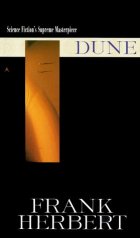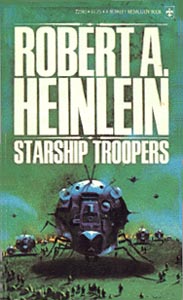Frank Herbert goes in a completely new direction with his fourth book in the Dune series, God Emperor of Dune. This novel has quite a different feel than the first three. The setting takes place 3500 years after the ending of Children of Dune. Dune’s ecological transformation is complete except for a small patch of desert. As a result of the transformation, the sandworms (and the supply of new spice) died off. Leto has almost completely transformed into a sandworm, and has taken over as leader of the galaxy. He’s been working on his “Golden Path” all this time while sitting on the last big hoard of spice.
Aside from the lack of new spice, there are a few other developments. The Guild Navigators are working with Ix to develop a way to safely travel through space without spice. Leto is aware of this plot, but does not seem to be worried. Also, Leto has continually resurrected the Idaho ghola to act as the leader of his female army, the Fish Speakers. One of the youngest in Leto’s breeding program, Siona, has rebelled and stole his secret personal journals. She sends these to the Ixians hoping to find some type of weakness so that she can kill Leto. To complicate matters, Leto has ordered one of his top Fish Speaker guards, Nayla, to act as a double agent, obeying Siona even if she is ordered to attack him. This is all set up within the first 50 pages or so.
One of the main things that annoyed me with this book is the constant ramblings of Leto which don’t make much sense. Before each chapter there is a section from the stolen journals which has some sort of wise saying about the workings of the world, human nature, war, or economics. Some of the stuff makes sense, but most of it seems a bit out there. Leto makes it clear early on that Siona is to be tested to see if he can explain the Golden Path to her.
I lost count of the references to the Golden Path in conversations between Leto and his servant Moneo Atreides, father of Siona. With only 50 pages or so I got frustrated because I still wasn’t sure what the Golden Path was. It turned out that Herbert doesn’t reveal this until the last few pages. The first three quarters of the book were a fairly tedious read. The last part I finished in just a few hours, where before I could only read a few chapters before having to take a break.
There is some seriously messed up stuff that happens toward the end of the book that I won’t go into because of spoilers. Trust me, you’ll know it when and if you read it. Now is a good time for me to take a bit of a break from the Dune books. I’m sure I will read the rest sometime in the future, but right now I have several other books that I’ve been anxious to get to.


